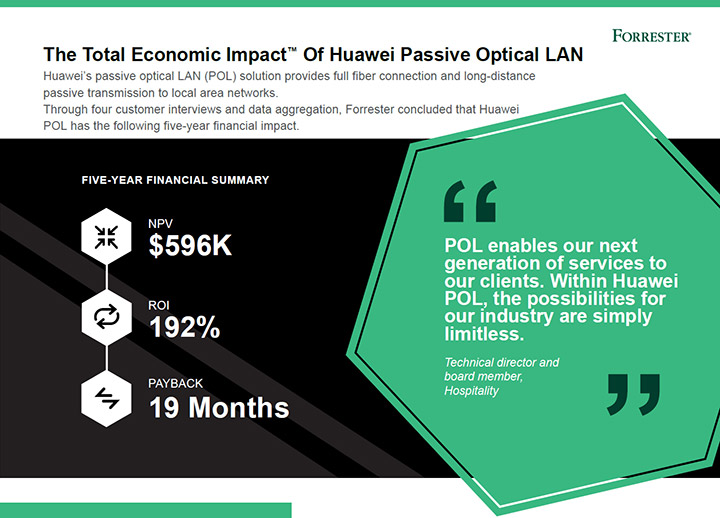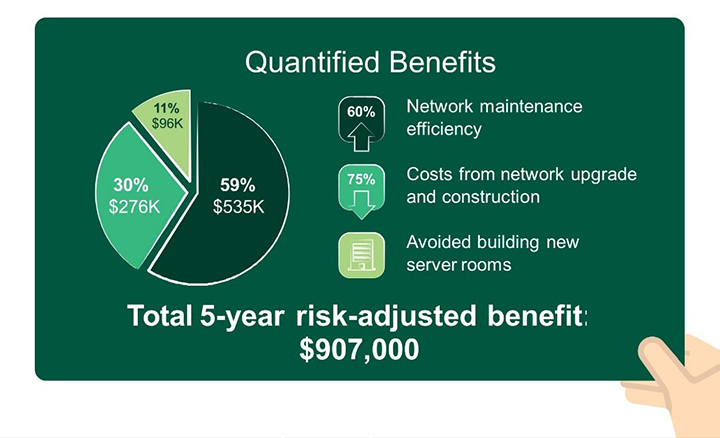Enterprise products, solutions & services
[Shenzhen, China, February 22, 2022] Recently, Huawei commissioned Forrester Consulting to conduct a study, The Total Economic Impact™ Of Huawei Passive Optical LAN. According to the study, the return on investment (ROI) of enterprises using Huawei's passive optical LAN (POL) solution is 192% in five years, and the payback period is 19 months.
To realize digital transformation, enterprises use more and more next-generation information technologies such as cloud computing, big data, and Internet of Things (IoT). As the underlying infrastructure of such technologies, network connectivity has become the cornerstone of digital transformation in various industries. Based on an in-depth survey of application cases in the higher education, healthcare, hospitality, and manufacturing industries , the Forrester study found that the Huawei POL solution reconstructs local area networks with full-fiber connections, multi-service bearing, and passive long-distance transmission. This solution reduces extra low voltage (ELV) room space, improves O&M efficiency, and avoids repeated construction investments. According to the financial analysis, an enterprise campus with 6000 information points can obtain a net present value (NPV) of $596K in five years.

From the study commissioned by Huawei titled: The Total Economic Impact™ Of Huawei Passive Optical LAN, February 2022
Forrester used a proprietary methodology to quantify the benefits of technology investment based on the case study. The study describes the business benefits of the Huawei POL solution for enterprises, including quantified benefits, unquantified benefits, and flexibility. In addition, a financial model of the TEI (Total Economic Impact™) composite organization is established based on the enterprise campus to quantify the net present value (NPV).
Quantified benefits:

From the study: The Total Economic Impact™ Of Huawei Passive Optical LAN
Unquantified benefits: Based on ultra-broadband transmission over fibers, POL improves network experience in the education, healthcare, hospitality, and manufacturing industries, facilitating digital transformation and business growth.
Flexibility: The green and sustainable POL fiber infrastructure can meet requirements for 30 years, avoiding repeated investment. In addition, the POL solution provides future-oriented service convergence, promoting digital transformation and improving competitiveness of enterprises.
In the study, the technical director and board member for a group of tourist resorts said, "One of the key moments that really accelerated the decision to switch to the Huawei POL network was [when the traditional network was] down on a peak checkout day, which [created a] really bad experience for our customers."
The IT manager of a manufacturing firm said, "Huawei's ONU can operate under 70 degrees Celsius, which supports our industrial environment. We also prefer to use a PON network."
Huawei POL solution extends fiber to each room, desktop, and machine in campus scenarios of various industries, reducing cabling costs, providing high bandwidth and low latency, and enabling sustainable development for enterprises.
Note: Total Economic Impact (TEI) is a methodology developed by Forrester Research that helps companies to communicate the value proposition of their products and services to customers, as well as demonstrates, justifies, and realizes the financial benefits of ICT initiatives to both senior management and other key business stakeholders.